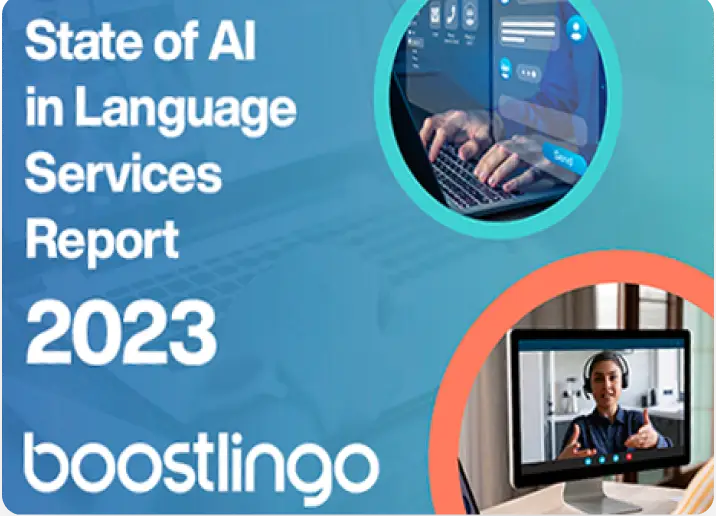
Boostlingo State of AI in Language Services 2023 Report
The 38 page Boostlingo State of AI in Language Services 2023 Report provides a fresh view of the language industry’s perspective on Artificial Intelligence (AI), with a unique focus on the interpretation market.
Language service providers (LSPs) have quickly adopted AI tools into their operations and some language services, with 44% incorporating AI tools into their workflows. 2024 will be a formative year as many LSPs plan to increase their usage of AI.
The State of AI in Language Services 2023 Report is Boostlingo’s first report on AI technology. It analyzes the language industry’s perspective on the new technology through two primary stakeholders: language service providers and on-demand remote interpreters.
Over 250 participants completed a survey answering questions around their current usage, perception, and future expectations of AI in language services.
State of AI in Language Industry
Amidst the rapid advancements and concerns over AI, this study of over 250 language industry stakeholders identified key trends around AI to plan for integration and enhance language service operations. Get the full report here.

More about Boostlingo’s State of AI in Language Services 2023 Report
The report identifies adoption rates of AI Tools, outlining key trends from LSPs and remote interpreters currently integrating AI into their operations and workflows. It also examines common challenges when integrating AI in remote interpretation.
Additionally, the report covers perceived challenges of AI and unpacks how well AI is meeting the needs and expectations of industry stakeholders. We also examine how the industry views the reliability of AI in language services.
The future of AI in language services is assessed through identifying common themes around participant responses, expectations of job market impact, and anticipated adoption of AI tools.
The report presents a conclusion, which discusses the challenges and ethical concerns around the advent of AI in language services. Lastly, it outlines opportunities for the way forward and summarizes key trends around AI in the language industry.
Table of Contents
Current Usage of AI by LSPs and Remote Interpreters – Pg. 9
The adoption of AI in language services is becoming more mainstream as LSPs discover that AI tools can significantly improve efficiency in different tasks and processes.
This section showcases the current usage of AI by LSPs and remote interpreters and explores areas for caution, challenges, and considerations for implementation as they integrate AI-powered technologies into their operations.
Find out what tools these stakeholders are using and understand how they are impacting their workflows!

Sentiment Towards AI In the Language Industry – Pg. 20
Artificial intelligence is making great strides across different sectors and the language industry is no different. While a good number of LSPs and language professionals perceive AI in a positive light, there are some who express concerns about AI’s rapid integration.
As AI continues to make its way into various parts of the language industry, understanding the sentiment of stakeholders towards the technology can serve as a gauge for how well it’s meeting their needs and expectations.
Discover how LSPs and remote interpreters perceive the reliability of AI across different language services.

Future Expectations of AI in Language Services – Pg. 28
Different players in the language industry are highly aware that AI is evolving and being adopted at an exponential rate. In language services, stakeholders are keenly watching the trajectory of AI and its potential implications for the future.
In the coming years, it’s expected that there will be increased integration of AI tools and that upcoming technologies will significantly impact the job market.
Examine the future trends and expectations of AI in language services in this section.

Challenges, Ethical Concerns, and Opportunities for AI in The Language Industry – Pg. 36
The advent of AI in the language industry, while promising, has been met with a series of challenges and ethical concerns that demand attention.
AI systems will become more sophisticated in the coming years, but the language industry must watch out for reliability concerns, data privacy issues, and the technology’s threat to human employment.
Be aware of ethical considerations as well as the next steps tech developers and the language professionals will need to take to maximize the technology’s impact in the industry.

What Can I Do with This Report?
Watch Our Webinar on the State of AI
Boostlingo hosted a roundtable webinar titled ‘What is the state of AI in language services?’ covering findings from the report. You can access a recording of the event on the linked page.